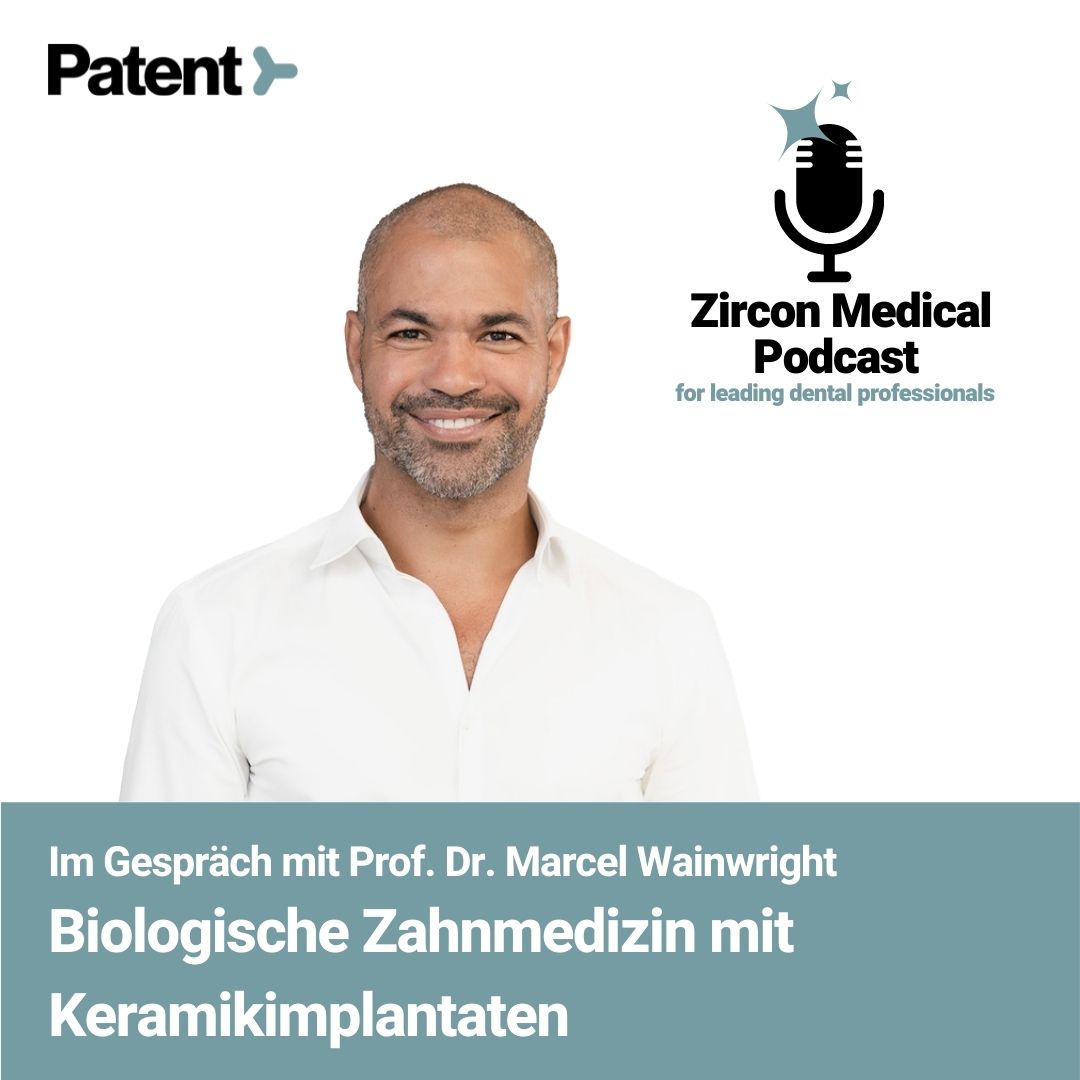Professor Dr. Marcel Wainwright
Chief Dentist for Integra Biohealth in Luxembourg
Specializes in biological dentistry, cosmetic dentistry and facial aesthetics/ biological anti-ageing therapies, ceramic implants, minimally invasive oral surgery
Graduated from RWTH Aachen University Dental School in 1996
Ambassador for the European Association for Ceramic Implants since 2020
70+ scientifically published papers
Website: https://www.integra.lu/en/team/dentists-therapists/prof-dr-marcel-wainwright.html
Instagram: @marcelwainwright
Facebook: https://www.facebook.com/people/Marcel-A-Wainwright/100014302356282/
LinkedIn:https://www.linkedin.com/in/marcel-prof-dr-wainwright-1603a3136/
2-2A Rue Joseph Leydenbach, 1947 Luxembourg
In Conversation with Professor Dr. Marcel Wainwright
In recent years, the concept of biological dentistry has gained immense traction amongst dentists and patients alike. There’s an increasing awareness of the potential risks associated with metallic implants and fillings and a growing recognition of the basic fact that the human mouth can’t be isolated from the whole body. Despite this awareness and the increasing body of evidence in support of ceramic implants, there’s still a massive gap in the implementation of biological dentistry.
Our team at Zircon Medical recently hosted Dr. Marcel Wainwright, a specialist in biological dentistry at Integra Biohealth in Luxembourg, on our podcast series to discuss biological dentistry with ceramics.
Introducing Professor Dr. Marcel Wainwright, the chief dentist for Integra Biohealth in Luxembourg
Dr. Marcel Wainwright is one of the world’s foremost experts in biological dentistry. He specializes in biological dentistry, cosmetic dentistry and facial aesthetics/ biological anti-aging therapies, ceramic implants, and minimally invasive oral surgery. He has served as the Ambassador for the European Association for Ceramic Implants since 2020 and is currently the chief dentist for Integra Biohealth, a biologic dental clinic in Luxembourg.
Dr. Wainwright says he knew he wanted to become a dentist at a fairly young age. He interned with a dentist when he was only 14 years of age, and he immediately developed a lifelong fondness for the profession. When he attended university, his professor Dr. Peter Eckert imbued within him a deeper love for dentistry. Dr. Wainwright says he has briefly considered a career in acting because he was artistic inclined, but he eventually followed his aspirations to become a dentist.
What’s your current challenge with dental implants?
My current challenge is... (choose)
The importance of biological, holistic dentistry
Dr. Wainwright says biological dentistry is all about looking at the patient from the whole body instead of reducing them to the mouth region. It involves using biological materials that don’t cause any hypersensitivity or allergic reactions - materials that the body does more than merely tolerate. The human body doesn’t contain any metals, and biological dentistry aims to preserve that state of being. It involves consistently avoiding metallic materials for implants, prosthetics, and fillings in favour of non-metallic materials, such as ceramic.
Switching from titanium to ceramic implants
Dr. Wainwright says titanium doesn’t produce consistent results. Most people are aware that titanium dioxide implants are associated with numerous negative side effects, such as corrosion, hypersensitivity, inflammation, and allergic reactions. Ceramic implants aren’t plagued by these problems.
Dr. Wainwright placed his first ceramic implant in 2006, a time when ceramic implants were still considered a niche product. At the time, his dental clinic in Düsseldorf had 17 or 18 titanium implant systems, so they did a lot of implants. A small number of his patients often asked about metal-free implants, even back in 2006. However, Dr. Wainwright says he completely switched from titanium to ceramic implants only about 8 years ago — he no longer provides any metallic or titanium implants.
While making the transition from titanium implants to ceramic implants, Dr. Wainwright was propelled by two factors — increasing demand for metal-free implants from patients and an increasing body of immunological data in favor of ceramic implants. Upon talking to experienced colleagues and observing the available immunological data, Dr. Wainwright realized that the proportion of people with negative titanium implant reactions was increasing consistently. That prompted him to switch to ceramic implants completely.
An overview of biological holistic dentistry
Dr. Wainwright provides a comprehensive overview of what biological holistic dentistry entails at his dental clinic. He says the process starts with an intensive screening. They examine the patient and ask about their history of general diseases. They also make intensive x-ray diagnostics, often based on 3D radiology. They check the patient’s immune system, including their vitamin D, vitamin C, and cholesterol levels. These factors determine the potential outcome of the implant surgery, so they must be considered in advance.
After developing a comprehensive overview of the patient’s immune health and medical history, they proceed with the initial therapy. If the patient doesn’t take any vitamin preparations, he puts them on supplements. If the patient doesn’t take vitamin D every day, Dr. Wainwright says he makes them take vitamin D supplements because people living in those latitudes don’t receive enough sunlight to synthesize sufficient vitamin D through food sources alone. As such, most people should be taking vitamin D supplements regularly.
Dr. Wainwright says vitamin D deficiency is a common issue in his geographical area for all patients, regardless of their age. He ensures his patients have 60 nanograms per milliliter of vitamin D to reduce the risk of inflammations. He also measures his patients’ LDL cholesterol levels — implants can also be compromised because of high cholesterol levels. Once the patient’s biological markers are at optimal condition, he says the patient is ready to undergo any surgery with minimal risks.
Biological dentistry also involves selecting the correct ceramic implant system. Dr. Wainwright says he performs thorough research to find an implant with a sufficiently rough surface — the rougher the surface, the easier it is for the cells. He acknowledges that the Patent™ Dental Implant System certainly takes the lead in implant surface roughness. “I do not know any system which has a higher roughness (than Patent™),” Dr. Wainwright says.
According to Dr. Wainwright, biological dentistry also involves ensuring optimal recovery. He instructs his patients on proper oral habits and lifestyle changes to improve the recovery process. Besides monitoring his patients closely, he says they’re asked to avoid using their tongues on the implant. This is one of the leading reasons why implants don’t settle properly in the first few weeks after the surgery — the patient keeps meddling with the implant with their tongue. Dr. Wainwright carefully instructs them to avoid licking the implant surface.
Inhibitions to widespread ceramic integration
Despite a growing body of evidence in favor of ceramic implants over titanium implants, the proportion of implant use is still tilted towards titanium. Most dentists continue using titanium implants instead of ceramic implants, even though patients and dental professionals are increasingly making the shift. When asked about this trend and the continuing disparity in ceramic implant integration, Dr. Wainwright attributes it to a fear of change.
Dr. Wainwright compares the situation to the awareness that the world is round, not flat. He says it took centuries for mankind to be convinced that the earth is not a flat disc — people were naturally hesitant to new ideas. He says the same thing applies to dentistry and implantology — humans are creatures of habits, and the prospect of shifting to a new type of dental implant system can be scary.
However, like all technologies, Dr. Wainwright says ceramic implants will become more mainstream with continued market awareness. The more that people talk about ceramic implants, the more dentists will start offering ceramic implants. It’s not enough to show clinical evidence to dental professionals and dentists — they must be informed that ceramic implants aren’t that different from titanium implants and can be easily implemented.
Dr. Wainwright says ceramic implants can now do everything that titanium implants can. They involve similar handling, are easy to use and are available in two-piece implants. Once dental professionals realize that shifting from titanium implants to ceramic implants doesn’t entail a massive change, they’ll be more open to the idea. The ceramic implant process only involves a few extremely minor changes that can be learned through a quick course.
Be cautious of inflammation in periodontal tissues
Dr. Wainwright says ceramic implants can now do everything that titanium implants can do. However, dentists must only be careful when dealing with single-tooth implants that are immediately restored and loaded, also known as immediate full mouth rehabilitation. In this situation, the dentist must ensure the periodontal tissues are completely clean and healthy, which can be done through ultrasound. Ceramic dental implants should only be placed if the conditions are completely clean and healthy — no inflammation.
When asked about future goals, Dr. Marcel Wainwright says he’s keen on offering a series of courses on the 12th and 13th of March, 2022, at the Integra Biohealth dental clinic. He says he’s fairly easy to find online — you can enter his name on Google or find him on LinkedIn, Instagram, or Facebook. He will also soon present at the platform Osteocom, where he’ll be one of the many speakers discussing the subject of biological dentistry. You can listen to Dr. Wainwright for yourself at our Zircon Medical Podcast.
Register for our free newsletter.
Never miss one of our weekly episodes with leading dental professionals.
How the Patent™ Implant System Maintains Optimal Surface Roughness
An independent article by the Zircon Medical Team
In the aforementioned podcast, Dr. Wainwright mentioned that the ideal ceramic dental implant must have a sufficiently rough surface. The rougher the surface, the easier it is for the cells to bond with the implant, facilitating osseointegration and biointegration. He acknowledged that the Patent™ Dental Implant System takes the lead in implant surface roughness, saying, “I do not know any system which has a higher roughness.”
Expanding upon that thought, we discuss why surface roughness is essential for osseointegration and how the Patent™ Implant System maintains optimal roughness.
The ideal dental implant must have a very rough surface that allows newly-forming bone tissues to nestle along with the implant. The rough topography allows cells to mechanically anchor the surrounding implant bone in and around the implant.
While zirconia implants are tissue-friendly, they initially struggled to find methods to achieve sufficient roughness. Earlier methods relied on adding surface roughness after sintering, which led to surface cracks that eventually caused the mechanical failure. Unfortunately, some manufacturers still use those methods, leading to a high risk of fractures.
The Patent™ Dental Implants, in contrast, are created in the pre-sintered stage. Any micro-cracks induced in the process are closed in the following sintering process wherein the object shrinks approximately 20%. Thanks to this unique production process, the ceramic implants maintain a strong, stable, ultra-rough zirconia implant surface with a 5x larger surface area than a machined surface.












